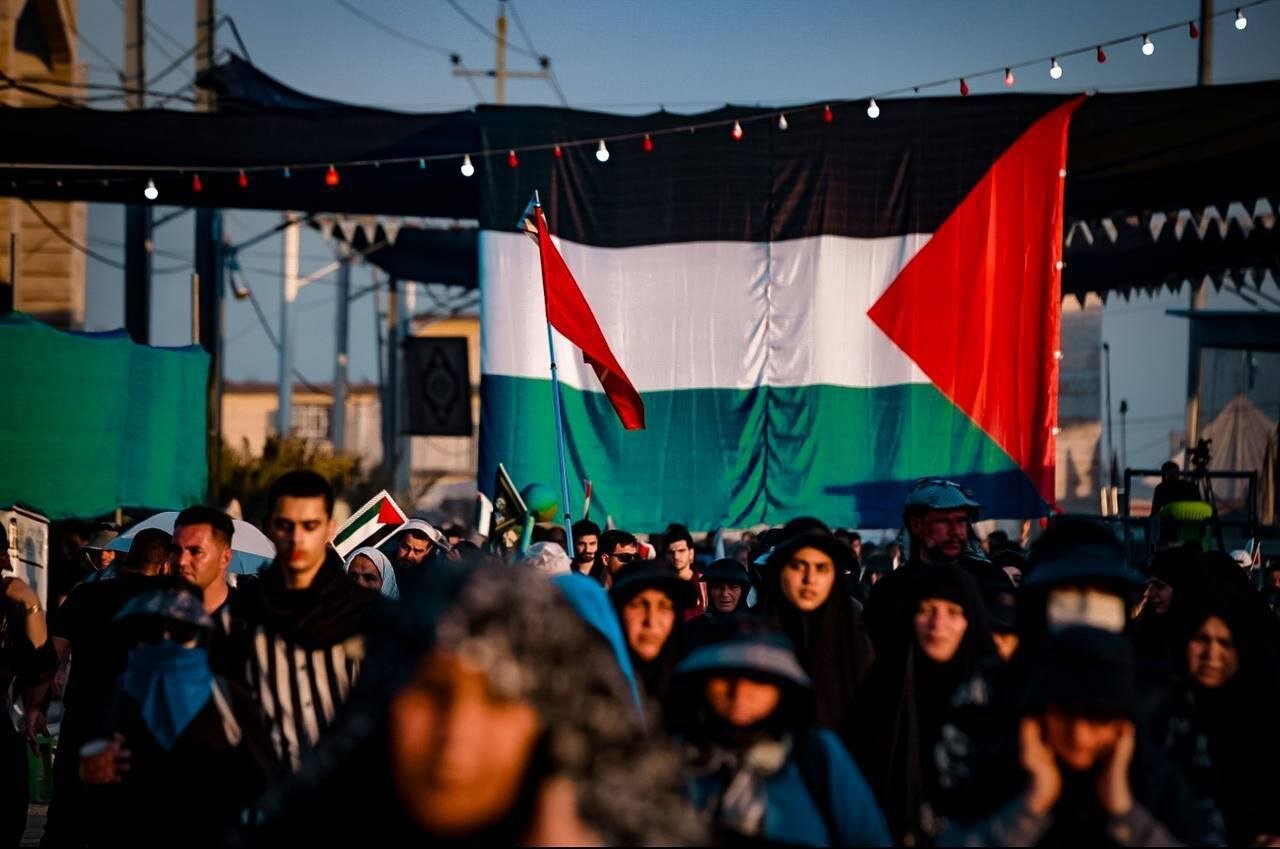Arbaeen of Disavowal
Pilgrims on Arbaeen walk mourn Imam Hussein (AS) while slamming Israeli crimes against Palestinians

The Arbaeen pilgrimage is a profoundly unique experience, especially for first-timers. Walking tens of kilometers under the scorching sun to reach the holy shrine of Imam Hossein (AS), sharing space with people from diverse backgrounds and nationalities, and relying on the kindness of strangers for sustenance and shelter, are all experiences far removed from daily life.
This year, however, a new element has been added to the pilgrimage. Millions of participants are experiencing a sense of being part of a larger anti-Israeli campaign, a collective sentiment though not unprecedented in the history of Arbaeen, has become the most valiant it has ever been in 2024.
Examining the logic behind Arbaeen and its intended representation reveals why its heightened anti-Israeli essence makes perfect sense. Arbaeen commemorates the 40 days following the martyrdom of Imam Hussein (AS), who died fighting for justice, dignity, and freedom. As the grandson of Prophet Muhammad (PBUH) and the son of Imam Ali (AS), he stood against Yazid's army in Karbala, believing that “death with dignity is better than a life of humiliation.” Imam Hussein(AS) and his companions sacrificed their lives in Karbala for justice, righteousness, and the pursuit of truth.
Each year, Muslims participate in Arbaeen to honor and remember his message. It is only fitting that they also show solidarity with the Palestinians, who are striving for justice in a manner reminiscent of Imam Hussein’s struggle in 680 AD while distancing themselves from Israel, which they see as the modern-day Yazid.
“Imagine how Imam Hussein (AS) would feel if he saw the loss of innocent lives [in Gaza] today. Wouldn’t he openly express his adversary to the Zionist regime? As followers of Imam Hussein (AS), we should do the same,” said Hujjat al-Islam Mohammad Qomi, the head of Iran’s Islamic Development Organization. “We must ask ourselves if we have raised our voices enough. Whether we are visiting Karbala this year by taking part in the Arbaeen walk or mourning the martyrdom of Imam Hussein (AS) from afar, we must remember to publicly disavow Israel,” the cleric added in a video message addressing Muslims, millions of whom have traveled to Iraq this year to be by the third Shia Imam’s holy shrine.
Israel’s war against the besieged Gaza Strip, which began on October 7, has created horrors many deem just as terrifying and tragic as what happened during the battle of Karbala. Over 40,000 people have lost their lives as a direct result of the regime’s carpet bombing of Gaza, and about 180,000 more civilians are expected to follow suit. The enclave is engulfed by diseases, as people struggle to quench their thirst or soothe their hunger due to a full blockade over Gaza by Israelis. In such a situation, participants in the Arbaeen walk may feel that, although they cannot directly confront Israel, they can still contribute to raising awareness about the regime's actions against Palestinians by waving Palestinian flags, carrying banners, or reciting elegies.
"I used to think that if Karbala had happened today, Muslims in Kufa and Medina would not leave Imam Hussein alone as they did 13 centuries ago," a young Pakistani pilgrim told Iranian media near Karbala, her luggage adorned with a picture of a Palestinian child beside his deceased mother. "But look at what's happening now," she continued, her voice heavy with emotion. "The same fate that befell Imam Hussein and his companions is being repeated with the Palestinians, and the majority of Muslims are silent. Except for Iran, Lebanon, Iraq, and Yemen, which make up less than 10 percent of the Muslim world, the rest are watching Palestinians being slaughtered. I never thought I would witness another Karbala with my own eyes."
Leave a Comment